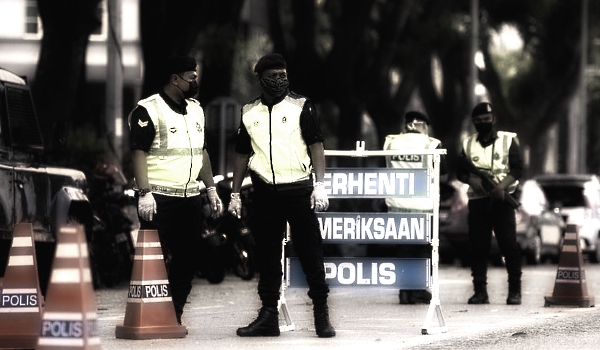By Lim Sue Goan, Sin Chew Daily
I have been receiving SMS messages from MKN reminding the public to comply with the SOPs in order to break the infection chain.
Is this the only thing the authorities are capable of doing? Why is it that from the time the MCO 2.0 was enforced on January 13 until the CMCO today, our daily infection numbers remain in four digits?
As we have not flattened the curve, the government continues to ban people from traveling out of state. As a result, the entire market is dead and many economic sectors are barely surviving.
Prime minister Tan Sri Muhyiddin Yassin has proposed that a complete lockdown will never be enforced again but will be replaced by more targeted restrictions based on the number of infection clusters in a particular area. The thing is, when is this going to be implemented?
For over a year, many low and middle-income people and businessmen have been suffering tremendously under different versions of movement control orders. If the restrictions are not relaxed, I'm afraid many people may not get to survive eight more months, until herd immunity is supposed to be achieved by end of this year.
Statistics show that the financial positions of many Malaysians have been badly hit by the coronavirus pandemic.
The Statistics Dept, for example, has pointed out that monthly salaries of first degree holders have hit a record low, down sharply from RM2,001-RM2,500 in 2019, to only RM1,001-RM1,500 for most of them in 2020. This puts fresh graduates' monthly salaries on par with the minimum monthly wage of RM1,200 for inexperienced unskilled workers. What is there to talk about becoming a high-income country?
Over a thousand ringgit a month hardly keeps one adequately fed in big cities and towns, not to mention other dependants at home.
Weirdly, minister in the PM's Dept Mustapa Mohamed says low income is not a problem, and graduates should be thankful that they can manage to find jobs.
Is the minister trying to hint that the country's job market is in a very bad shape now?
Additionally, Bank Negara's statistics show that the ratio of household debts to GDP also went up to 93.3% in December 2020, from 87.5% six months earlier, showing that indeed many Malaysians have been hard pressed by mounting debts.
Household debts will further erode Malaysians' purchasing power, and this in turn dampens the overall market sentiment, putting many local businesses on the edge. And this will invariably develop into a vicious cycle that pounds our economic recovery.

As a matter of fact, a lot of SMEs are already fighting very hard to stay afloat. A January survey conducted by SAMENTA (Small and Medium Enterprises Association) found that 54% of SMEs experienced drastic drop in their sales last year, and only 30% of SMEs recorded positive growths. Additionally, 10% of them laid off workers last year, and 7% more are expected to do so this year. If the situation gets worse, millions of Malaysians may have to look to their EPF savings to pull through, posing an imminent threat to social stability.
To revitalize the national economy, we need to lift travel restrictions. Unfortunately the vaccination program has been going on rather slowly while daily new infection numbers remain high, such that the people are still not allowed to travel freely within their own country.
The CMCO in Selangor, KL, Johor, Penang and Kelantan is being extended until April 14, and if interstate travel ban is still not lifted by Hari Raya, the economy for the first half of the year is as good as gone!
Vaccination takes time, so the key now is to contain the spread of the virus.
Sadly, the government only knows how to make routine announcements on daily new infection numbers without proposing any effective, professional and targeted strategies to tackle the deadly virus.
With primary and secondary schools now fully reopened, we have seen the emergence of some 20 new infection clusters related to the education sector.
Health DG Dr Noor Hisham revealed lately that nine cases involving the B.1.351 South African variant had been detected in this country as of March 31. However, the health ministry subsequently failed to elaborate on how the variant had infiltrated our community, or whether more genome sequence analyses had been carried out, and whether the variant would affect the efficacy of existing COVID-19 vaccines.
Already quite a number of countries have experienced new waves of infection spikes and are forced to resort to new rounds of lockdown policies because of the variants. We simply cannot afford to take things too lightly here. We must speed up mass screening, track the close contacts and identify the source of infection soonest.
On April 3, we reported as many as 1,638 new COVID-19 cases, with the R0/Rt ratio climbing to 1.02, the highest in a month. We saw a total of 8,968 new cases in the most recent week, up slightly from the 8,929 reported a week earlier. This shows that CMCO simply does not work!
In the meantime, the number of people registering for vaccination is still very low at 7,906,913 or 32.6% of the country's above-18 population. The blood clot reports associated with the AstraZeneca vaccine has dampened Malaysians' will to register for vaccination.
The government has also failed to announce its plans to immunize undocumented migrant workers in the country, and has not even opened for them to register. It's already April now, and we simply do not have too much time to waste!
The situation now is neither too good nor too bad, and the government should not be contented with such an outcome. Perhaps we can take cue from neighboring Singapore's model to stamp out community infections so that restrictions can be lifted as soon as possible.
We have no choice but to act fast now!
ADVERTISEMENT
ADVERTISEMENT


































